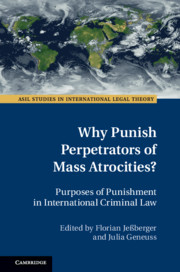Book contents
- Why Punish Perpetrators of Mass Atrocities?
- ASIL Studies in International Legal Theory
- Why Punish Perpetrators of Mass Atrocities?
- Copyright page
- Contents
- Contributors
- Preface
- Abbreviations
- 1 Introduction: The Need for a Robust and Consistent Theory of International Punishment
- 2 The Practical Importance of Theories of Punishment in International Criminal Law
- Part I Setting the Framework: Criminological, Historical and Domestic Perspectives
- Part II Rationales for Punishment in International Criminal Law: Theoretical Perspectives
- Part III Consequences for the Practice of the International Criminal Court
- 16 Prosecution Strategy at the International Criminal Court in Search of a Theory
- 17 Selectivity in International Criminal Law
- 18 Theories of Punishment in Sentencing Decisions of the International Criminal Court
- 19 Theories of Punishment at The Hague
- 20 From Punitive to Restorative Justice
- 21 Concluding Remarks
- Select Bibliography
- Index
18 - Theories of Punishment in Sentencing Decisions of the International Criminal Court
from Part III - Consequences for the Practice of the International Criminal Court
Published online by Cambridge University Press: 07 February 2020
- Why Punish Perpetrators of Mass Atrocities?
- ASIL Studies in International Legal Theory
- Why Punish Perpetrators of Mass Atrocities?
- Copyright page
- Contents
- Contributors
- Preface
- Abbreviations
- 1 Introduction: The Need for a Robust and Consistent Theory of International Punishment
- 2 The Practical Importance of Theories of Punishment in International Criminal Law
- Part I Setting the Framework: Criminological, Historical and Domestic Perspectives
- Part II Rationales for Punishment in International Criminal Law: Theoretical Perspectives
- Part III Consequences for the Practice of the International Criminal Court
- 16 Prosecution Strategy at the International Criminal Court in Search of a Theory
- 17 Selectivity in International Criminal Law
- 18 Theories of Punishment in Sentencing Decisions of the International Criminal Court
- 19 Theories of Punishment at The Hague
- 20 From Punitive to Restorative Justice
- 21 Concluding Remarks
- Select Bibliography
- Index
Summary
Gerhard Werle and Aziz Epik discuss the impact of theories of punishment on the sentencing decisions of the ICC. In their view, the question of ‘why punish’ has – and should have – an impact on the ‘how’ of punishment, i.e., on the sentencing process and its outcome. After a careful analysis of the ICC’s sentencing decisions, they come to the conclusion that a consistent approach with regard to the sentencing objectives can be detected, but that judges do not elaborate on how these objectives influence and guide the sentencing decisions. In the following, the authors outline a coherent sentencing model that takes into account theories of punishment and the objectives of sentencing. Because its most important requirement is to ensure proportionality, Werle and Epik discuss the factors that should be taken into account in determining the gravity of the crime and the culpability of the offender. Within the proportionality framework, in order to ensure special deterrence and rehabilitation, the individual circumstances of the offender can also be taken into account.
- Type
- Chapter
- Information
- Why Punish Perpetrators of Mass Atrocities?Purposes of Punishment in International Criminal Law, pp. 323 - 352Publisher: Cambridge University PressPrint publication year: 2020
- 1
- Cited by



